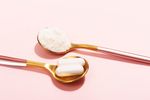As readers of this blog and my patients know, longevity medicine is one of my greatest passions. Besides spending time with my loved ones, there’s nothing more rewarding to me than working with patients to guide them on a path toward longer, healthier, more vibrant lives.
While some lifestyle adjustments may be bigger than others, the process doesn’t have to be arduous. That’s where health hacks come in – those creative, often simple solutions that can result in big health improvements. And, whether you’re in peak form or dealing with health conditions that need attention, I’ve got a hack for you. It’s called glycine. I like to think of it as the Swiss Army knife of amino acids, an under-the-radar hero that’s capable of doing your health and longevity a world of good, without a lot of extra effort.
When you hack your health with glycine – a little goes a long way, no need to overdo it – you’re augmenting your body’s supply with things like glycine-rich high-protein foods, supportive behaviors, and supplements. It’s easy to keep your tank topped up. To learn more about this endlessly useful amino acid, start here:
So, what is glycine?
Got amino acids? Yup, everybody does, and the amino acid glycine is one of the 20 amino acids the body uses in different combinations to make the thousands of different proteins that enable our bodies to function properly. While the 9 ‘essential amino acids’ can only be obtained from the foods you eat, glycine is one of the 11 ‘nonessential’ amino acids the body produces itself. But nonessential doesn’t mean unimportant – quite the opposite. It is, for example, essential to the body’s production of glutathione, the powerful antioxidant that helps protect the body from disease-triggering (and aging) free radicals, cell damage, cancer progression, metabolic problems and more. So, making sure your body’s got enough glycine on hand is essential to both health and longevity.
What does glycine do for you?
Beyond being a fundamental building block of proteins, glycine delivers a number of remarkable health benefits, especially when it comes to looking and feeling well – and more youthful. For starters, glycine stimulates serotonin production, aka the ‘feel good’ hormone.’ It also plays a key role in nerve signal transmission, acting as an inhibitory neurotransmitter, calming or inhibiting neuronal activity. Why does that matter? Well, according to researchers at Harvard Medical school, neural excitation is linked to shorter lifespans, while suppression of overactivity appears to extend them.
Glycine is also a key component of collagen, the most abundant protein in the human body, the stuff’s that’s essential for your tissues to develop, grow, repair, and remain healthy. Collagen, and another indispensable protein, elastin, contributes to the structural integrity and flexibility of connective tissues such as tendons and ligaments, and your skin and bone as well. That makes glycine enormously important, helping bodies of all ages maintain tissue health and elasticity. Staying limber and physically active – no matter what your age – is what helps keep quality of life high for longer.
Among the other items on the to-do list of this very busy compound, glycine lends its support to:
- a healthy gut by contributing to the production of glutamine which helps maintain the integrity of the gut lining
- better mood, memory and cognitive function thanks to its role in serotonin production (the ‘feel good’ hormone)
- better longevity, by encouraging relaxation and better sleep by serving as a central nervous system inhibitory neurotransmitter
- detoxification processes in the liver, aiding in the breakdown of toxic chemicals and substances
- the production of creatine, which helps with muscular health and performance
- optimal immune cell function, helping defend against infection, while also tamping down oxidative stress and inflammation
- the production of nucleic acids, including DNA and RNA, which are essential for cell development and replication
Glycine ups your anti-aging game
Yes, glycine, by promoting collagen production, helps make skin looks younger and more supple. But glycine’s benefits go well beyond skin-deep. There’s evidence indicating that glycine prolongs life by activating autophagy – the body’s cellular house-cleaning system that breaks down sub-par cells, then salvages the remaining good bits, recycling the components to help build fresh, new, healthy cells. Glycine also supports the production of new mitochondria, the cellular power plants that keep the whole human machine running. As a bonus, it also tamps down the production of pro-inflammatory proteins called cytokines, keeping a lid on an overactive immune system and chronic inflammation.
Glycine: a win in the metabolic column
There’s also good evidence that glycine can potentially help manage age-related metabolic dysfunction, conditions like insulin resistance, cholesterol issues and obesity. Studies suggest that glycine enhances insulin sensitivity, promotes glucose uptake in the tissues, and regulates lipid metabolism, helping to curb risk factors for classic age-related diseases like type 2 diabetes and cardiovascular disease.
What are good food sources of glycine?
Because glutathione levels decline as you age, and glycine can help slow the glutathione slide, it’s a good idea to keep your levels high by eating protein-rich foods. Topping the list:
- High-quality organic meat and poultry, preferably from healthy “pastured” or grass-fed animals
- Wild or pole-caught oily fish
- Organic or farmers’ market dairy products
- Organic or farmers’ market legumes
Glycine done right – through the ages
Given all the good things glycine does, there’s a good case to be made for supplementation. If you think glycine is worth looking into for your particular situation, as always, start by checking with your doctor first to be on the safe side.
With your doc’s guidance, and by following recommended dosing instructions, you can minimize the possibility of exacerbating existing medical disorders or creating any negative interactions with medications or supplements you may currently be taking. This is particularly important for those taking mental health medications or antipsychotics. While glycine is generally well tolerated, some people may experience GI discomfort. Though allergic reactions are rare, should they arise, seek appropriate treatment immediately.
But assuming you have your doc’s go-ahead, glycine supplements – usually 1 – 3 grams a day is the baseline – can have a positive impact on so many aspects of your well-being, from sleep quality and skin health to brain function, metabolic processes, muscular and cardiovascular health, disease prevention, and beyond.




